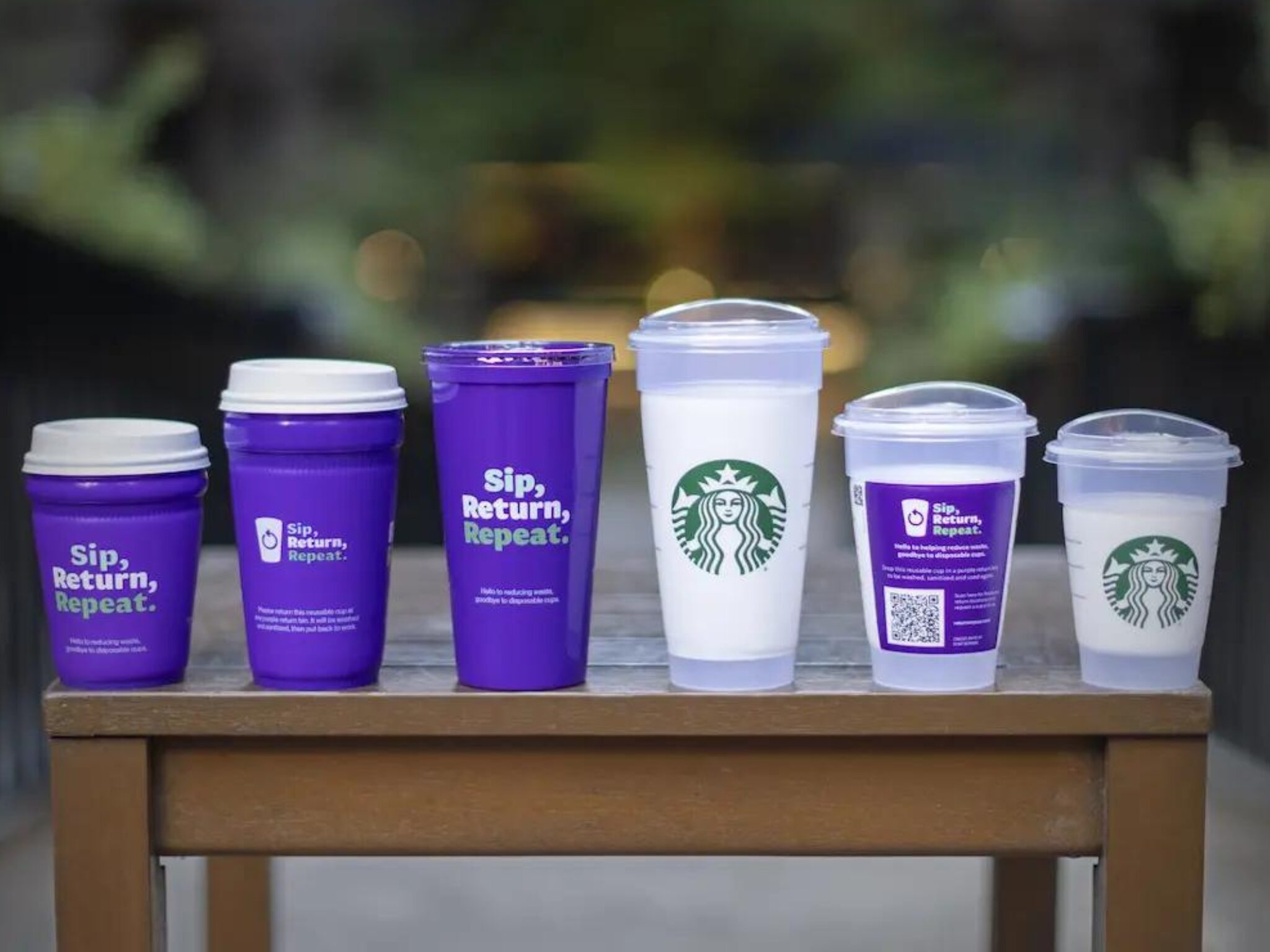Starbucks to Lead City-Wide Reusable Cup Project in Petaluma, California
8 Mins Read
A coalition of cafés and restaurants are participating in a city-wide reusable cup project in Petaluma, California, with the goal of reducing waste from single-use plastics.
More than 30 eateries, including Starbucks, KFC, Dunkin’, Burger King and Peet’s Coffee, have collaborated on a first-of-its-kind reusable cup pilot in the city of Petaluma in California.
The trial will be led by the Center for the Circular Economy at Closed Loop Partners, which convenes the NextGen Consortium, a project co-founded by Starbucks and McDonald’s that is on a mission to overhaul single-use food packaging and drive reuse. It counts The Coca-Cola Company and PepsiCo as sector lead partners.
Starting on August 5, the three-month initiative will see customers be served to-go drinks in specially designed purple cups, which they can drop off at participating stores across the city. These will then be sanitised and prepared for reuse in stores.
While Starbucks has conducted over two dozen reusable cup tests around the world, by collaborating with industry partners (and competitors), the project’s reach is widened considerably. The aim is to make reusable cups the default option for takeaway drinks, just as Petaluma mulls a ban on single-use cups (it has already outlawed foam cups).
“Last year, Starbucks conducted a similar test in the same area, but we tested on our own. This year, we expanded on that through our partnership with NextGen Consortium to drive systems change,” said Helen Kao, director of reusable at Starbucks.
“What if we saturated a community, and reusables became the cultural norm? Now it’s an ecosystem of global brands, local businesses, city leaders and community groups working together. The industry is realising that it’s easier to partner than do things alone,” she added.
How does the reusable cup project work?

When you order a takeaway latte at one of eight participating Starbucks stores in Petaluma, or a Coke at Burger King, for the duration of the trial, you’ll be served the drink in the purple cups branded ‘Sip, Return, Repeat’ for free.
Once you’re done with the beverage, you can return it to one of more than 60 collection points spread across participating businesses and public spaces in Petaluma. You don’t need to wash these, or even remove the straw or lid – that’ll be taken care of at the next step. If you take the cup home, you can also schedule a pickup. The initiative is designed to make reuse as easy as throwing a single-use cup for customers.
After the cups are returned, they’re collected, professionally washed and sanitised, and returned to stores for further use by reusable packaging solutions company Muuse. Any cups found to be unfit for reuse will be recycled locally.
Which companies are involved?

The Petaluma Reusable Cup Project involves over two dozen brands, from global chains to national and local businesses. All of them will serve drinks in these reusable cups while the project is live, until November.
Here is the full list of businesses involved in the pilot:
- A&W
- Aqus Café
- Avid Coffee
- The Bagel Mill
- Bonchon
- Costeaux
- Circle K
- Divine Mother Tea N Coffee
- Dunkin’
- Grand Central
- The Habit Burger Grill
- KFC
- Mary’s Pizza Shack
- Once Upon a Slush
- Peet’s Coffee
- Petaluma Coffee & Tea
- Petaluma Pie Company
- Quiote
- Refill Mercantile
- Starbucks
- Stellina Alimentari
- Stellina Pronto
- Taco Bell
- Target
- Tea Room Café
Why Petaluma?

A marketing campaign will see ads on billboards, bus stops, and other public locations around Petaluma to raise awareness about the initiative. But why was the Californian city chosen in the first place?
The project’s organisers call it “an ideal community” to explore packaging waste solutions, as there has been interest from residents and businesses alike in trialling new systems, and the city government has already been active in sustainability efforts via a phaseout of non-recyclable single-use packaging.
Petaluma is also a sizeable city with a dense geographical layout, including a walkable downtown area with a tight cluster of restaurants and shops, and mixed-use suburban neighbourhoods and rural landscapes. All this creates suitable conditions for testing the reuse system, and working together with local stakeholders, the project has been adapted to local policy and infrastructure.
“We have an amazing, engaged community, and we look forward to assisting the success of this programme, alongside our local restaurants and participating global brands that service our community,” said Petaluma mayor Kevin McDonnell.
Why is this needed?
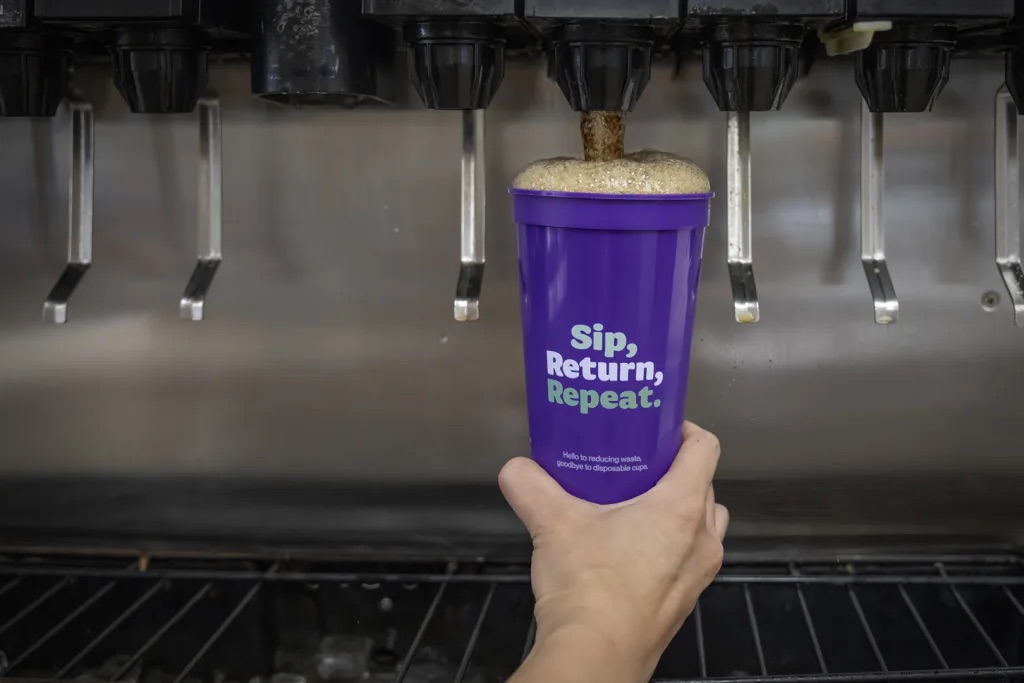
Plastics is notorious for being one of the most planet-harming materials, with its production linked to 3.4% of all greenhouse gas emissions (more than the entire aviation sector). This is set to double by 2060, and that’s before you take into account the fact that it takes anywhere between 20 to 500 years for plastic to decompose.
In the US, 50 billion single-use cups are bought and disposed of each year, most of which start with restaurants and end up being tossed out at home, work or school. The average lifespan of these cups is less than one hour, according to the Center for the Circular Economy’s research.
Even paper cups are lined with plastic to ensure they don’t absorb liquids or collapse when hot liquid is poured in, but research has shown that this thin coating of plastic can leach chemicals into water and harm aquatic animals, as well as expose humans to microplastics.
Shifting to reusables would help keep billions of cups from landfills, free up land and labour resources, and lower greenhouse gas emissions. “Transitioning to returnable packaging systems is a critical part of reducing single-use packaging waste, and we need to focus on supporting the operations behind it,” said Muuse co-founder and COO BeBrittanythany Gomez.
What are the reusable cups made of?
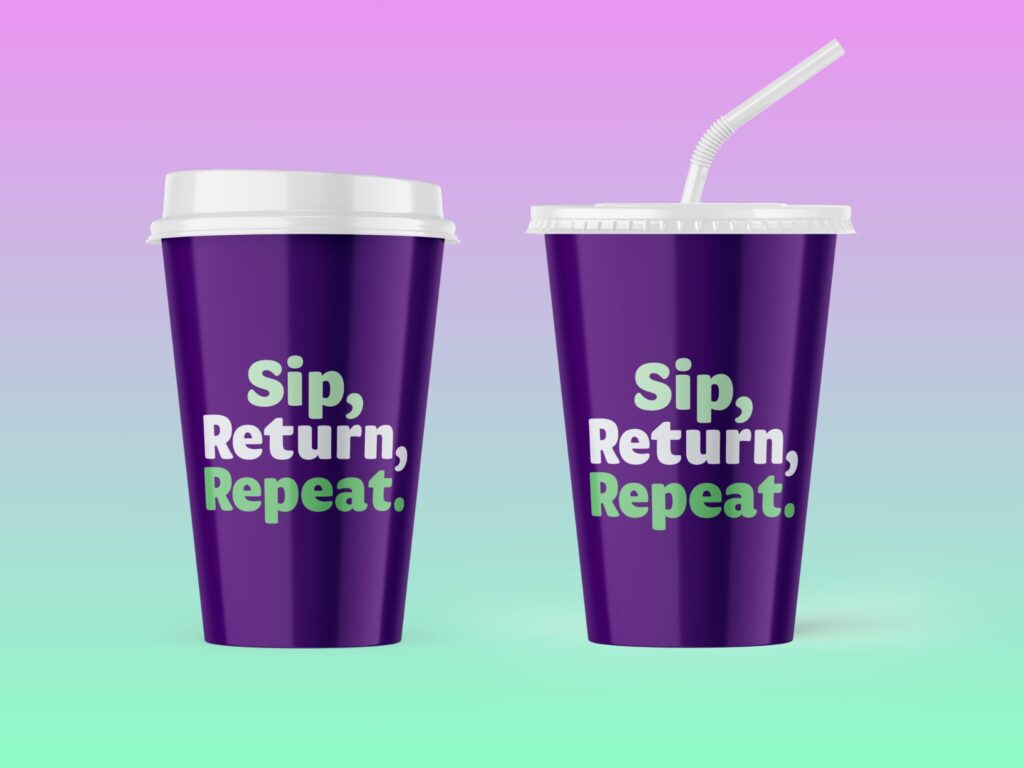
The purple reusable cups that you’ll encounter in Petaluma over the next three months are made from two types of BPA-free plastics commonly used in the food industry.
Lightweight polypropylene cups will be used for hot drinks (up to 100°C/212°F) and at many locations serving iced or cold beverages. This is the same plastic used for takeout containers, lunchboxes and yoghurt pots. At some locations with soda fountains or iced drinks, the project will use HDPE, which is often used for milk jugs, sodas and food storage boxes.
Using plastic cups to eliminate plastic seems counterintuitive, regardless of whether it’s BPA-free or not. But the organisers explain that while stainless steel is a good material for at-home washing, these cups require much more material and energy to produce, meaning they’ll have to be in circulation for a long time before their environmental benefits really take shape.
Since they can be washed and sanitised like silverware or glassware, reusable plastic cups ultimately require fewer natural resources to produce than single-use cups. Plus, the organisers argue, they’re lighter and easier to transport than metal, ceramic and glass, reducing the number of trucks needed to collect and redistribute these cups.
But while these reusable cups are recyclable, they don’t contain recycled content in the first place. This is due to the limited availability of food-grade recycled plastics.
Will it work?
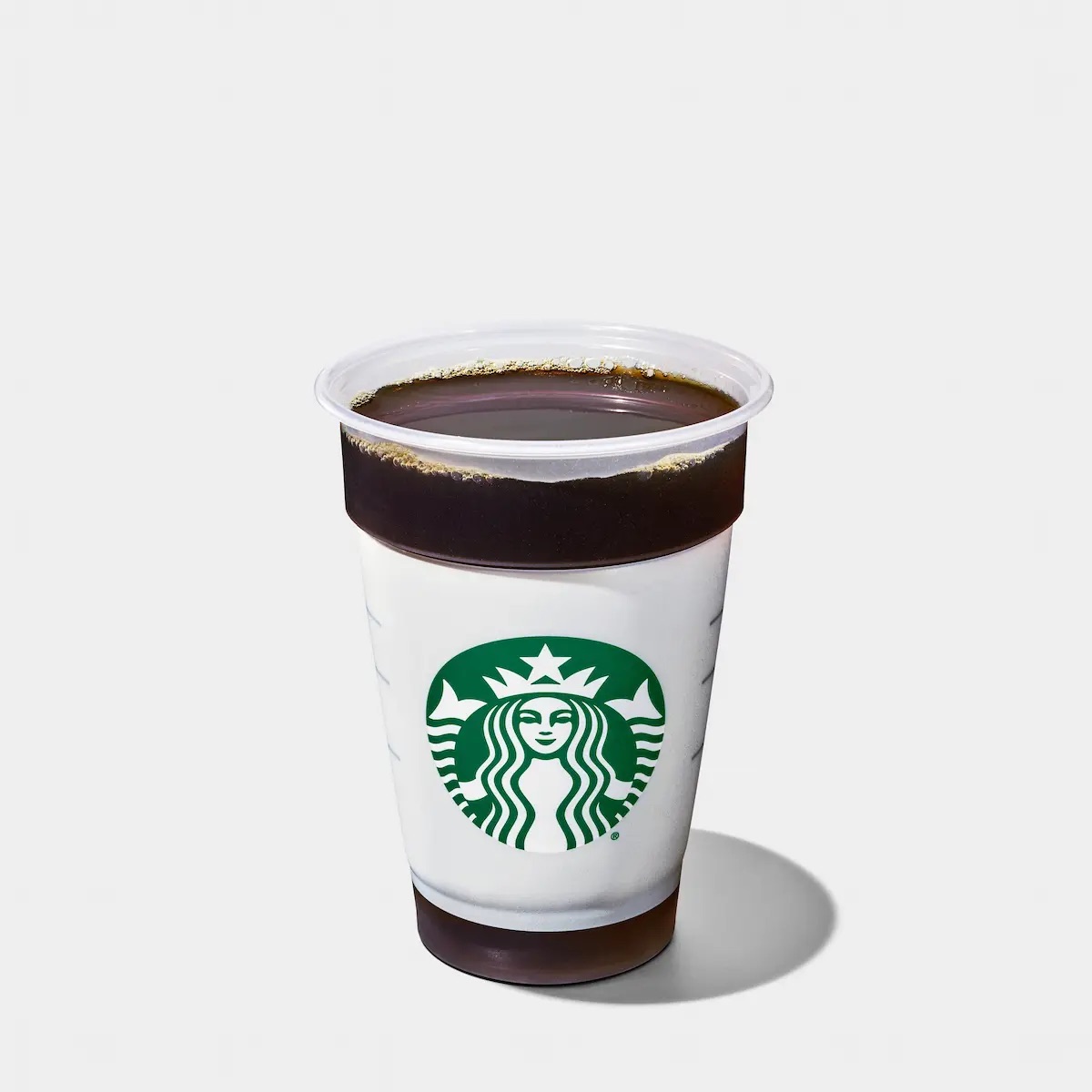
Starbucks previously aimed to shift from disposables to reusable by 2025, and has tested reusable cups for years now. It first trialled reusable cup rental services via Go Box in 2021. And for years, it has offered customers a discount if they bring their own cup (albeit with a break in this policy during Covid-19).
But the world’s largest coffee chain has admitted that there are hurdles in getting enough people to care and bring their own cups. “The challenge is, especially when you have return bins only in Starbucks, that it’s hard to get all those cups back and really make the environmental impact that’s intended,” Amelia Landers, VP of product experience and innovation at Starbucks, told Fast Company.
“We found that financial incentives don’t always work like we think they will,” added Kate Daly, managing director of the Center for the Circular Economy. “We’ve done tests with even the most simplified return process and cash handouts for return and found that was an insufficient incentive. We know that deposit programs that require somebody to sign up for an app and put their credit card in create a real barrier to people participating in reuse.”
So instead of focusing on incentivisation, the Petaluma Reusable Cup Project is centred on ubiquity and scale-up. “Interoperability is really critical. People are on the go – they shop at one place, they’re disposing of items at other places. Reuse needs to be seen as easy and convenient and not that you have to pay attention to ‘this belongs here and not there’,” explained Daly.
The project’s organisers also intentionally designed the cups to be functional but not desirable. “We want to make sure that people don’t participate in a reuse system by taking home a reusable cup and never returning it,” said Daly. “Because then that’s not a reuse system. That’s a more carbon-intensive single-use system.”
What happens next?
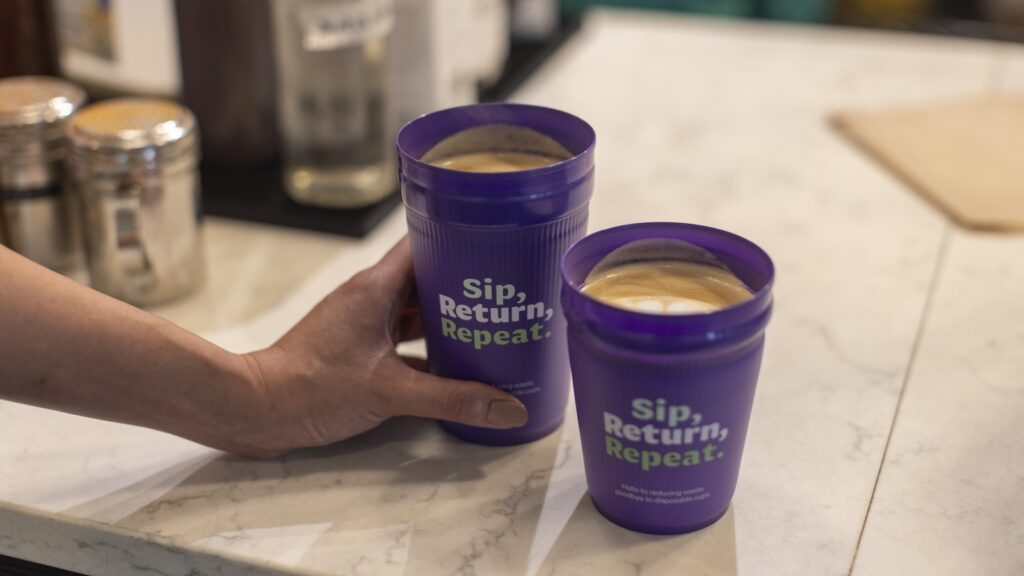
Over the next three months, the initiative will collect baseline data to measure customer participation and the climate impact of offering reusables as the default choice, with an eye on whether the model can viably be scaled.
The analysis will include studying employee opinions about the programme, and the results will be published by the NextGen Consortium. The data can be leveraged by businesses and regulators to help design new reuse systems and draft informed packaging regulations, respectively.
“By testing reuse across an entire city in partnership with key stakeholders from the community and industry, we can scale reuse collaboratively through thoughtful experimentation, building a future where reuse is the norm,” said Daly.
If successful, the scheme could be made permanent, with the consortium happy to donate the cups and return bins after the pilot period if the community wants to keep using them. The trial could further be used as a model for other cities in Sonoma County and beyond.
“Imagine a neighbourhood where all to-go cups are reusable, and returning these cups required no extra steps. By making reusable cups as convenient and accessible as single use, we can offer an alternative for residents when they forget to bring their own cups with them,” said Leslie Lukacs, executive director of Zero Waste Sonoma. “Universal accessibility creates the foundation for a cultural shift towards reuse.”

